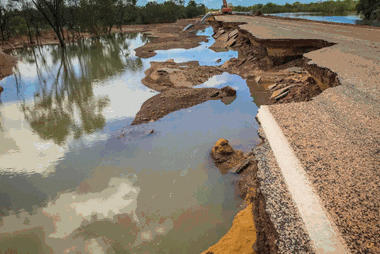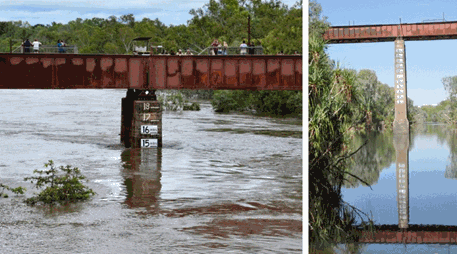

Damage to Highway 1 after floodings Katherine Bridge in February (left) and July (right)
Is it wise to travel the tropical north of Australia in the wet season?
The decision is yours. We do not claim to be meteorologists, however based on our knowledge, our own experience, as well as feedback we continuously receive from our customers, we strongly suggest to travel outside the wet season. In the northern part of the continent, ‘the Wet’ annually wreaks havoc by means of severe cyclones and torrential rains, resulting in flooded highways and extreme high humidity.
Because of these unpleasantly muggy conditions, mosquitoes and sandflies are out in force to spoil your holiday fun. Being in the tropics in the wet season is definitely not recommendable, especially not for kids as the hot and humid conditions are a recipe for many sleepless nights. Only 12V fans in the living area of your camper or in the roof top tent, this could cope with this heat and humidity reasonably well. There are a few 4WD campers equipped with 12V fans but most have not cooling possibilities for the nights.
It is definitely not all doom and gloom in the wet season up north: there are definitely pockets with beautiful weather and sunny days, but there is still the very high humidity which makes you feel like having a shower every hour. Flooded highways and inundated campgrounds in the wet season will definitively throw a spanner in the works if you have a fairly tight travel itinerary. So unless you have unlimited time for your trip, we strongly recommend to stay away from the north, north west and north east from early November until at least mid-April.
Watch this video of floods in Broome in January 2022. Continue reading below the video.
How about travelling by 4WD camper in the Top End and Kimberley during the wet season?
So what if you still wish to continue with your travel plans, despite the above mentioned warnings? Well, just keep the following info in mind: all unsealed roads in the Kimberley and Top End are closed during the wet season. Think of the Gibb River Road, the track to Purnululu NP, Jim Jim Road, Bloomfield Track, etc. These are no-go zones from mid-December until at least the end of March. In some years roads were even closed until late April/early May due to extensive damage to the road surface sustained during the floods.
As there are not many travellers who start or finish their holidays in Darwin and Broome in these months, more and more rental companies close their camper depots during the wet season. Please note that if you do decide to travel up north in the wet season, you will need to discuss your planned itinerary with the depot manager on pickup of your 4WD camper. He/she is authorised to restrict you from entering particular areas based on the road and weather conditions at the time.
A good alternative for a trip in the north during the wet season is a camper holiday in for example south Western Australia. The weather in that part of the continent in the months of December, January, February and March is usually pleasant with moderate to warm temperatures while all unsealed roads will be open then in this part of the country. Please keep in mind that January is very busy everywhere in the south west, south and south east because of the Australian summer school holiday.
An almost invisible deadly danger in the ocean
Important: box jelly fishes occur along the coast between Exmouth and Bundaberg, from late October into May. These are among the most venomous creatures on earth so it goes without saying that swimming at a.o. Cable Beach, the beaches of the Dampier Peninsula and Eighty Mile Beach is prohibited because of deadly jelly fishes. Here you will find a lot of information about this almost invisible danger in the ocean. The creatures are also called stingers.
